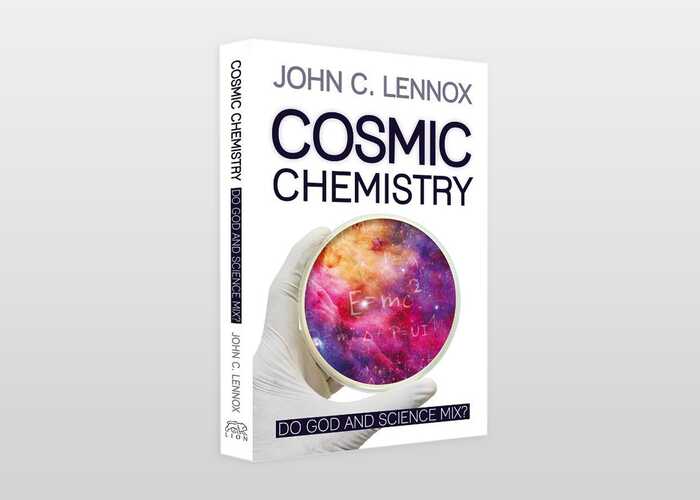Cosmic Chemistry by John C Lennox

In John Lennox’s latest book, Cosmic Chemistry, he carefully presents the theistic worldview in the light of new scientific developments. Both a Christian and a mathematician, he presents in a very detailed way, the workings of creation from the aspects of genetics, physics, chemistry, quantum mechanics and systems biology, to name but a few! A comprehensive read, there is no doubt that it will be an easier read for those with a scientific background. Although the book builds on arguments in an earlier book, “God’s Undertaker: Has Science Buried God?” it is not essential to have read that book before tackling this one.
The book is divided into five parts: Surveying the Landscape, Science and Explanation, Understanding the Universe and Life, The Modern Synthesis and The Information Age. Perhaps, because I am a biological/medical scientist I found the first two chapters interesting though less easy to read, based as they were on historical perspectives and terminologies. I actually found that going back to these chapters after reading the entire book provided an easier read (for me anyway!).
One of the most fascinating areas for me was that of Darwin’s theory of evolution and natural selection discussed in Part 4. At school, most of us will have been taught about the truism of the theory of evolution and, I myself, have always been a great proponent of evolution (in the context of an ever-present God). Cosmic Chemistry highlights how Darwinism is not without criticism, and the certainty of evolution is not so clear-cut. I was shocked to the core but fascinated to learn that the fossil record, while giving evidence for micro-evolutionary events, does not actually provide evidence of macro-evolution. The latter includes large events such as the transition from reptiles to birds, where transitional species would be expected to exist. A regularly quoted example of such a so-called transitional species is the Archaeopteryx. Rather, it could perhaps be better described as an intermediate species, with no actual concrete evidence to prove it has descended from species A and been an ancestor of species B. As Lennox quotes from the zoologist, Mark Ridley, “If evolution is true, species originate through changes of ancestral species: one might expect to be able to see this in the fossil record. In fact, it can rarely be seen. In 1859 Darwin could not cite a single example.”
Lennox also reminds us that Darwinism is generally not rebuffed and that there has been and still remains an issue in certain scientific circles. Those challenging Darwin’s theory are portrayed as being in the “lunatic fringe” much in the same way that Galileo was accused of heresy by the Catholic Church for challenging that the sun revolved around the earth. How the tables have turned! Perhaps contemporary atheists, like Dawkins, should contemplate the way they often close down any theological discussion form the Christians!
Another interesting area is explored in Part 2. Do miracles really happen and how is it possible to explain these if we believe in the “laws of physics”? Lennox has elegantly gathered evidence to show how miracles can be possible as supernatural events and that even within defined laws of nature, which of course necessarily predict what is bound to happen, if those conditions are changed it is in fact our knowledge of the laws of nature that alert us to the fact that a miracle has happened!.
Lennox also provides plenty of useful analogies. For example, to counter the argument of God being simply a “God of the gaps” to explain away things we don’t understand, Lennox uses to good effect the example of a car and Mr Ford. Henry Ford is not the mechanism yet he is responsible for the mechanism in the first place. This is despite the fact that is he is not to be found in the gaps in our knowledge about the workings of internal combustion engines or any reason-giving explanations that concern mechanisms. It is the mechanism itself which bears the marks of his handiwork.
In summary, if you want to ensure you are up-to-date on the latest scientific apologetics I would recommend this book. A light read, this is not, but it is extremely thought-provoking and it made me realise that science is updating itself so fast, that the ongoing science-religion debate may yet move more people to a theistic viewpoint. The ever-evolving understanding of the complexities of life, especially with regard to systems biology and genetics, seems to give more evidence to a great designer rather than less. It’s also important for us, as Christians, who participate in the science-religion debate, to be fully up-to-date on our scientific arguments or we also open ourselves to be criticized by our atheist friends!
- The Rev’d Dr Jenny McKay
Posted on November 2nd 2022
